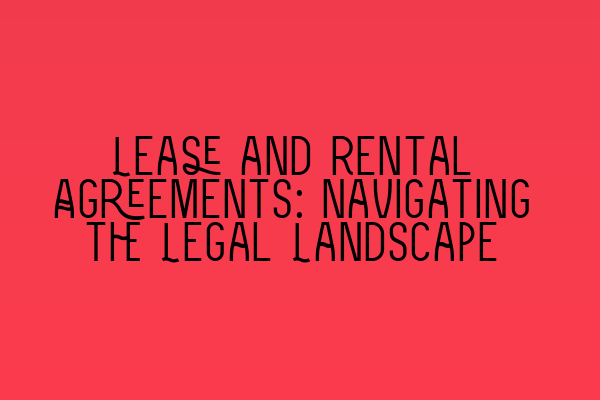Lease and Rental Agreements: Navigating the Legal Landscape
When it comes to leasing and rental agreements, understanding the legal landscape is crucial. Whether you are a tenant or a landlord, having a comprehensive understanding of the terms and conditions outlined in these agreements can help protect your rights and interests.
In this article, we will explore the key aspects of lease and rental agreements, discuss common misconceptions, and provide valuable insights to ensure a smooth and successful rental experience.
1. Key Elements of Lease and Rental Agreements
Lease and rental agreements are legally binding contracts that outline the terms and conditions of the rental arrangement. These agreements typically include:
- Names of the Parties: The agreement should clearly state the names of the tenant(s) and the landlord(s).
- Duration of the Lease: The agreement should specify the start and end dates of the lease or indicate the duration of the rental period (e.g., month-to-month).
- Rent Amount and Payment Terms: The agreement must clearly state the monthly rent amount, the due date, and the accepted methods of payment.
- Security Deposit: It is common for landlords to request a security deposit to cover any potential damages or unpaid rent. The amount and conditions for its return should be clearly outlined in the agreement.
- Maintenance Responsibilities: The agreement should specify who is responsible for maintenance and repairs, including any associated costs.
- Restrictions and Prohibited Activities: Landlords often include rules and regulations in the agreement to maintain a peaceful living environment. These may include restrictions on pets, smoking, and noise levels.
It is worth noting that lease and rental agreements can vary depending on the jurisdiction, type of property, and specific terms negotiated between the parties involved. Seeking legal advice or using a legal template can help ensure that the agreement is enforceable and fair for both parties.
2. Common Misconceptions
There are several misconceptions surrounding lease and rental agreements that can lead to disputes and misunderstandings. It is important to address these misunderstandings to promote clarity and avoid future complications. Some common misconceptions include:
- Verbal Agreements: Verbal agreements may hold some legal weight but are often difficult to enforce. It is recommended to have written agreements in place to protect the rights and obligations of all parties involved.
- Assumed Responsibilities: Tenants should not assume responsibilities that are not explicitly outlined in the agreement. For example, assuming responsibility for major repairs without written consent may result in financial hardships.
- Early Termination: Breaking a lease or rental agreement prematurely can have serious consequences, including financial penalties. It is essential to understand the termination clause and any associated fees before taking any action.
By dispelling these misconceptions and fostering open communication between landlords and tenants, the rental experience can be enjoyable and stress-free for all parties involved.
3. Seeking Legal Advice
Whether you are a tenant or a landlord, seeking legal advice is always a wise decision when entering into a lease or rental agreement. A solicitor specialized in contract law can review the proposed agreement, help negotiate the terms, and ensure your rights and interests are protected. This step can save you from potential legal disputes and financial liabilities down the line.
If you need legal assistance with lease and rental agreements or any other legal matters, our team of expert solicitors at SQE Contract Law would be happy to assist you. We provide professional advice and guidance to help you navigate the complex legal landscape.
Conclusion
Lease and rental agreements are an essential aspect of renting property, both for tenants and landlords. Understanding the key elements of these agreements, dispelling common misconceptions, and seeking legal advice when needed are crucial steps to ensure a smooth and successful rental experience.
For more information and resources on contract law and legal preparation for the SQE exams, please check out our related articles:
